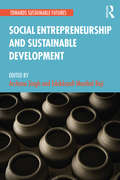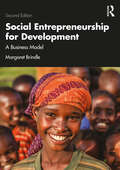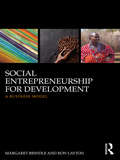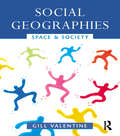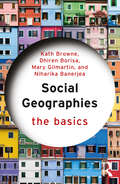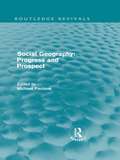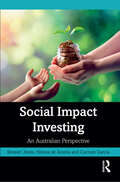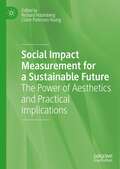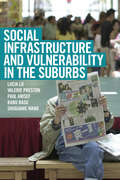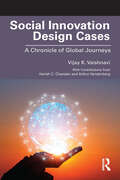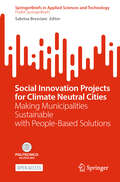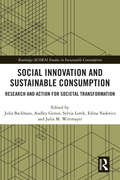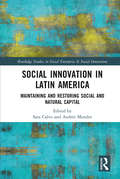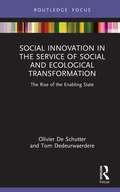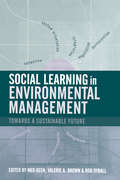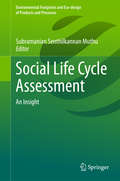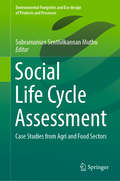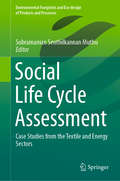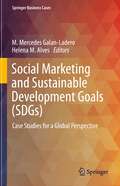- Table View
- List View
Social Entrepreneurship and Sustainable Development (Towards Sustainable Futures)
by Archana Singh Edakkandi Meethal RejiThis volume discusses the seminal interface between social entrepreneurship and sustainable development along with their inter-linkages. It traces the role of social entrepreneurship and innovations in societal transformation in creating sustainable societies, especially in developing nations. It explores how social entrepreneurship and enterprise is integral to the promise of fostering opportunities for socially disadvantaged groups (including the poor, women, and young people), as well as in addressing environmental and ecological issues apart from wealth creation. The book presents key concepts, case studies, and multiple innovative models involving social entrepreneurship, such as green financing, serial social entrepreneurship, sustainable livelihood creation, and well-being, in addition to highlighting global sustainable development goals of the United Nations. The chapters are organised under the broad themes of sustainability of the organisation, sustainability of the community, sustainability of the development, and sustainability of the community–organisation interface. They examine social change, social innovation, social enterprise, small and micro-enterprises, microfinance institutions, inclusive growth, education, productivity, physical health, waste management, energy retention, self-reliance, and corporate social responsibility. They contain emerging research issues in the field as well as critical assessments while bringing together theoretical and practitioners’ perspectives. This book will be useful to scholars and researchers of development studies, social entrepreneurship, sustainable development, environmental studies, public policy, and political sociology. It will also greatly interest professionals from non-profit, corporate, and public sectors, other development practitioners, and international bodies.
Social Entrepreneurship for Development: A Business Model
by Margaret BrindleSocial Entrepreneurship for Development, Second Edition, presents a fresh approach to poverty alleviation by bridging the fields of international development and social entrepreneurship. The authors present a six-step model for developing an IP business positioning strategy that allows developing country producers to position themselves better as owners of retail brands in foreign market countries. Readers will learn how producers can control the supply chain, including distribution to retail stores.Focusing on Africa and least developed countries (LDCs), the authors demonstrate methods of utilizing intellectual property tools, producer ownership, market positioning, and branding for lucrative outcomes. Extensive research provides readers with a thorough understanding of what it means to work smarter in a developing business, while a rich set of international cases offers insight into the practical applications of brand positioning, trademarks, and licenses. This new edition features brand new chapters on funding and environmental, social, and government goals (ESGs).With a dozen online workbooks to outline methodology, skills, tools, and case studies, Social Entrepreneurship for Development, Second Edition, remains a valuable resource for any student of social entrepreneurship or international development.
Social Entrepreneurship for Development: A business model
by Margaret Brindle Ron LaytonThis book presents a fresh approach to poverty alleviation by bridging the fields of international development and social entrepreneurship. The authors present a six-step model for developing an IP business positioning strategy that allows developing country producers to position themselves better as owners of retail brands in foreign market countries. Readers will learn how producers can control the supply chain, including distribution to retail stores. Focusing on Africa and least developed countries (LDCs), the authors demonstrate methods of utilizing intellectual property tools, producer ownership, market positioning, and branding for lucrative outcomes. Extensive research provides readers with a thorough understanding of what it means to work smarter in a developing business, while a rich set of international cases offers insight into the practical applications of brand positioning, trademarks, and licenses. With a dozen online workbooks to outline methodology, skills, tools, and case studies, Social Entrepreneurship for Development will be a valuable resource for any student of social entrepreneurship or international development.
Social Entrepreneurship in Sport: How Sport Can Deliver Social Wellbeing
by Vanessa RattenThe social role of sport enterprises is being increasingly recognized at both local and global levels. Sport has the ability to influence community cohesion, physical and mental health, social inclusivity, and provides positive role models across society. More businesses in sport are incorporating these social aspects into their plans as a way of differentiating themselves from their competitors. This, in turn, has led to more social innovation in sport. Recently, there has been more emphasis on social entrepreneurship in sport due to the growing need to capture its societal impact. This book explores the non-profit role sport plays in society, and demonstrates how social enterprises can both address some of the negative social outcomes of sport and support businesses as they develop their social objectives. The over-arching aim of the book is to focus on how social entrepreneurship in sport is important in developing a better global society.
Social Geographies: From Difference to Action (Wiley Blackwell Companions To Geography Ser. #19)
by Ruth PanelliHow do we describe ourselves? Where have we, do we, will we, live our lives? Why are the differences between people a source of tension? How can social change occur? Social geography can assist in addressing these questions. It provides ways of understanding and living in our contemporary world. Providing students with the resources to understand both the theoretical and empirical approaches social geographers take when investigating social difference, this text outlines key theoretical approaches and traces the core geographies of difference: class, gender, race/ethnicity, and sexuality. It concludes by showing how geographers work across these ideas of difference to understand questions of identity, power and action. Using illustrative examples from around the world, Social Geographies includes: - Individual chapters on the main theoretical approaches to difference - Individual chapters on the key concepts of identity, power and action - Reviews of the core literature, with suggestions for further reading - Biographies of key contemporary social geographers - Glossary of key terms For students beginning human geography courses, or in social geography modules, this book is the essential primer.
Social Geographies: Space and Society
by Gill ValentineMost social geography undergraduate textbooks are structured around different social categories, splintering the discussion of gender, class, race and increasingly now sexuality and disability, into separate chapters. This has the effect, firstly, of making social relations rather than space (the raison d'etre of human geography) the focus of undergraduate books; secondly of ignoring the way that social relations are negotiated and contested in different space. Rather than reproducing this conventional social geography format the aim of this proposed text is to make space the focus of analysis. In doing so the intention is to make complex theoretical debates about space more accessible to students and encourage them to look at their own environments in new ways.
Social Geographies: The Basics (The Basics)
by Mary Gilmartin Kath Browne Niharika Banerjea Dhiren BorisaSocial Geographies: The Basics introduces what social geography is, and what it might be. It outlines the key contours of social geographies, and also disrupts some of the conventions of the discipline in both its content and structure.This book approaches social geographies by beginning with the resistances, contestations and ‘solutions’ that communities use to challenge exclusions in place and space in order to create equitable societies. It then addresses the inequalities, precarities, and ‘problems’ that prompt these interventions. This allows the book to emphasise the importance of activism in the here and now, and to show how activism often makes issues visible and contested in ways that are then theorised by academics. Social Geographies starts with solidarities, communities, and networks before moving to examine difference, precarity, and mobilities. Each chapter offers key case studies that centre resistance, contestations of inequitable power, and local knowledges that can often be seen as ‘solutions’ to national and transnational issues, creating a decolonial understanding of ‘social geography from below’ within and across national contexts.This book is essential reading for undergraduate students and readers new to the area, as well as anyone studying introductory geography, social, cultural and critical geography, ‘the spatial turn’ and issues of spatialities, and key issues like precarity, power, difference, equality, and mobilities.
Social Geography: Progress and Prospect (Routledge Revivals)
by Michael PacioneThe examination of social questions is a relatively new development in goegraphy, but social geography has now blossomed into a fully fledged sub-discipline which has in fact influenced significantly all other areas of geography. This book, first published in 1987, presents an overview of recent developments in all the major branches of social geography. As such it provides a valuable introduction to te subject, a review of the latest state of the art and a pointer to future research directions.
Social Impact Investing: An Australian Perspective
by Carmen Garcia Stewart Jones Helena de AnstissSocial impact investing is gaining ground as one of the most important investment trends in the world. While the size of the social impact investing market is still relatively small in global terms, momentum continues to grow unabated. Australia in particular is looking to develop a vibrant and transparent social impact investment market. This book considers a number of innovative strategies and pragmatic policy initiatives that can see the social impact investment market flourish in Australia and internationally. The book describes how social impact investing can enter the investment mainstream and how a high-quality regulatory framework governing the measurement, reporting and evaluation of social impact will be critical to building investor confidence and ensuring the credibility, effectiveness and transparency of this market. It also examines different approaches to measurement and evaluation that will ultimately be critical to the success of this market. The authors also recognise that governments have a pivotal role to play in growing the social impact investing market, not only in its capacity as a market facilitator and regulator but also as an active purchaser of social outcomes. This book will be informative for those who wish to learn more about how governments, private investors, investment intermediaries, social enterprises, service providers and other market participants around the world can work together to initiate and grow a vibrant, transparent and well-functioning social impact investing market.
Social Impact Measurement for a Sustainable Future: The Power of Aesthetics and Practical Implications
by Claire Paterson-Young Richard HazenbergThis book explores the history of social impact measurement, offering justifications for the use of social impact measurement in modern society. It seeks to uncover the tensions inherent in social impact measurement, especially between creating and measuring social value creation. As the world becomes ever more globalised in its focus to deliver sustainable solutions to social and environmental problems, frameworks such as the United Nation’s Sustainable Development Goals (SDGs) provide basic structure through which social impact can be assessed and compared globally. Nevertheless, constructive critiques of such approaches are required to ensure that they do not misinform stakeholders, disenfranchise the disadvantaged and exacerbate existing social problems. In providing this overview, the book seeks to offer a critical review of the social impact measurement field centred on concepts of ‘empowerment’ and ‘social action’ (Weber, 1978), whilst also demonstrating best practice and potential pitfalls to policymakers and practitioners.
Social Infrastructure Maintenance Notebook
by Yu Huang Atsushi YashimaThis book explains in an easy-to-understand manner the “check” points to keep in mind when inspecting various social infrastructure structures. It is put together in a way that not only engineers who are on the front line of maintenance and management but also engineers who are not normally involved in maintenance and management of social infrastructures as well as general public can understand the importance of social infrastructure inspection work.
Social Infrastructure and Vulnerability in the Suburbs
by Valerie Preston Paul Anisef Lucia Lo Shuguang Wang Ranu BasuSocial Infrastructure and Vulnerability in the Suburbs examines how the combination of the low-density, car-centric geography of outer suburbs and neoliberal governance in the past several decades has affected disadvantaged populations in North American metro areas. Taking the example of York Region, a large outer suburb north of Toronto, the authors provide a spatial analysis that illuminates the invisible geography of vulnerability in the region.The volume examines access to social services by vulnerable groups who are not usually associated with the suburbs: recent immigrants, seniors, and low-income families. Investigating their access to four types of social infrastructure - education, employment, housing, and settlement services - this book presents a range of policy recommendations for how to address the social inequalities that characterize contemporary outer suburbs.
Social Innovation Design Cases: A Chronicle of Global Journeys
by Vijay K. VaishnaviSocial innovation is an innovation whose main aim is to benefit society. There is a worldwide need for and interest in conducting innovations and social innovations. Social Innovation Design Cases: A Chronicle of Global Journeys provides an in-depth description of the design journeys of twenty social innovation cases from twelve countries around the globe on five continents. The design cases span areas ranging from promoting rural economic development to addressing climate change. The book describes in depth, citing relevant references, the design journeys of the twenty social innovations and corresponding social enterprises, following an innovation design process model. Additionally, it describes the knowledge models and metamodels contributed by these cases. Each design case presents the overall business model of the social innovation and the corresponding social enterprise.The book is for social entrepreneurs, innovators and aspiring innovators, especially those actively planning and designing social innovations in for-profit, government and not-for-profit organizations. In addition to managers, executives and mid-level staff, the book is for students and trainees who would like to understand different kinds of social innovations as well as their design and implementation. Providing details on the design and implementation of a variety of successful social innovations, the cases presented can serve as templates for future social innovations. The book can empower social entrepreneurs and innovators to develop and implement ideas for the betterment of society at large.
Social Innovation Projects for Climate Neutral Cities: Making Municipalities Sustainable with People-Based Solutions (SpringerBriefs in Applied Sciences and Technology)
by Sabrina BrescianiThis open access book examines the role of social innovation in cities as an important lever towards climate neutrality. Social innovations are people-centred collaborative solutions, activating the urban ecosystem for change and providing platforms for citizens, civic organizations, the private sector, and governmental institutions to collaborate towards the goal of reducing greenhouse gas (GHG) emissions. The book, based on work developed within the EU-funded project NetZeroCities, which aims to support over 100 European cities to be climate-neutral by 2030, outlines methods, cases, and pathways of social innovation in Europe. It presents social innovation design process pathways through methods, categories of actions, and related cases for developing and scaling social innovations at the urban level, contributing to a systemic approach to tackle the grand challenge of reaching net zero. Within these pages, researchers and policymakers can find examples of cities that have deployed innovative public administration practices by systemically embedding social innovation in varied fields of urban action plans, including energy, citizen engagement, and behavioural change for lowering carbon emissions and increasing well-being.
Social Innovation and Sustainable Consumption: Research and Action for Societal Transformation (Routledge-SCORAI Studies in Sustainable Consumption)
by Audley Genus Sylvia Lorek Julia Backhaus Edina Vadovics Julia M WittmayerThis book showcases strategic policies for and processes of societal transformation, which are required to address the challenge of sustainability. Based on the latest thinking at the interface of social innovation, sustainable consumption and the transformation of society, the book provides: in-depth discussions at the nexus of sustainable consumption, social innovation and social transformation, highlighting their significance to sustainability-related policy and practice; detailed case studies of social innovation in energy, food, housing and policy which illustrate emerging practice and promising policy, business and civil society interventions; and critical reflections and commentaries on the contribution of social innovation to societal transformation. Bringing together aspiring scholars and leading thinkers on this topic, this book leads to compelling new insights for an international audience into the potential of social innovation for sustainable consumption and the transformation of society. It will be of great interest to students and scholars of sustainable consumption, sustainable development, (social) innovation studies and environmental sociology.
Social Innovation in Latin America: Maintaining and Restoring Social and Natural Capital (Routledge Studies in Social Enterprise & Social Innovation)
by Sara CalvoThe Latin American continent contains an incredibly rich diversity from which humans derive a range of ecosystem services (e.g. material goods, cultural benefits, climate regulation, etc.) that contribute to livelihoods and well-being. It has become critical to reconcile social and environmental issues in the region to ensure that development is sustainable and aligned with the Sustainable Development Goals. To ensure the sustainable use and management of social and natural capital in the region, business, government, social enterprises and NGOs are engaging in different forms of social innovation that account for social, ecological and environmental values. This requires the integration of social and natural capital into decision-making at all levels. Latin America presents a useful scenario to explore social innovation in relation to social and environmental values and the management of local human and natural resources. This book presents social innovation initiatives that incorporate social and natural capital into decision-making processes in Latin America. This book aims to provide the reader with an insight into the relevance of social innovation for maintaining and restoring social and natural capital in Latin America. Using case studies from Ecuador, Colombia, Peru and Mexico, this book provides an insight into the interactions between social innovation and social and natural capital in Latin America and will be of interest to researchers, academics and students in the fields of social innovation, management studies, environmental economics and sustainability.
Social Innovation in the Service of Social and Ecological Transformation: The Rise of the Enabling State (Routledge Focus on Environment and Sustainability)
by Tom Dedeurwaerdere Olivier De SchutterThis book explores how the State can play a role as an enabler of citizens-led social innovations, to accelerate the shift to sustainable and socially just lifestyles. To meet the twin challenges of environmental degradation and the rise of inequalities, societal transformation is urgent. Most theories of social change focus either on the role of the State, on the magic of the market, or on the power of technological innovation. This book explores instead how local communities, given the freedom to experiment, can design solutions that can have a transformative impact. Change cannot rely only on central ordering by government, nor on corporations suddenly acting as responsible citizens. Societal transformation, at the speed and scope required, also should be based on the reconstitution of social capital, and on new forms of democracy emerging from collective action at the local level. The State matters of course, for the provision of both public services and of social protection, and to discipline the market, but it should also act as an enabler of citizen-led experimentation, and it should set up an institutional apparatus to ensure that collective learning spreads across jurisdictions. Corporations themselves can ensure that society taps the full potential of citizens-led social innovations: they can put their know-how, their access to finance, and their control of logistical chains in the service of such innovations, rather than focusing on shaping consumers’ tastes or even adapting to consumers’ shifting expectations. With this aim in mind, this book provides empirical evidence of how social innovations, typically developed within "niches", initially at a relatively small scale, can have society-wide impacts. It also examines the nature of the activism deployed by social innovators, and the emergence of a "do-it-yourself" form of democracy. This book will appeal to all those interested in driving societal change and social innovation to ensure a sustainable and socially just future for all.
Social Learning in Environmental Management: Towards a Sustainable Future
by Rob Dyball Meg KeenSocial Learning in Environmental Management explores and expands the approaches to collective learning most needed to help individuals, communities, experts and governments work together to achieve greater social and ecological sustainability. It provides practical frameworks and case studies to assist environmental managers in building partnerships that can support learning and action on issues arising from human impacts on the life-support systems of our planet. In this book, social learning frameworks and case studies address the three areas of collaboration, community, government and professional, in some detail. The resulting guidelines and their practical applications provide key source material for undergraduate and postgraduate professional education in the fields of social and environmental sciences, political science, planning, geography and urban studies, and also for professionals in environmental management.
Social Life Cycle Assessment
by Subramanian Senthilkannan MuthuThis book details the primary concepts of Social Life Cycle Assessment (S-LCA), integration of social aspects in product life cycles, quantification of social impacts in S-LCA, impact categorization in S-LCA, methodological aspects of S-LCA, and detailed case studies. As the societal implications of producing a product are coming to take on a new importance, the concept of Social Life Cycle Assessment has recently been developed and is becoming increasingly prominent. However, S-LCA is still in its infancy and its impact categories for many industrial segments are still under development.
Social Life Cycle Assessment: Case Studies from Agri and Food Sectors (Environmental Footprints and Eco-design of Products and Processes)
by Subramanian Senthilkannan MuthuThis book highlights the Social Life Cycle Assessment (SLCA) of the agri-sector for rice, sugarcane, and cassava in Thailand and the food sector. It also presents a range of models, indices, impact categories, etc. for SLCA that are currently being developed for industrial applications. Though SLCA was introduced in 2010, it is still relatively new compared to environmental life cycle assessment (ELCA).
Social Life Cycle Assessment: Case Studies from the Textile and Energy Sectors (Environmental Footprints and Eco-design of Products and Processes)
by Subramanian Senthilkannan MuthuThis book highlights the Social Life Cycle Assessment (SLCA) of the energy and textile sectors. It also presents a range of models, indices, impact categories, etc. for SLCA that are currently being developed for industrial applications. Though SLCA was introduced in 2010, it is still relatively new compared to environmental life cycle assessment (ELCA).
Social Marketing and Sustainable Development Goals: Case Studies for a Global Perspective (Springer Business Cases)
by M. Mercedes Galan-Ladero Helena M. AlvesThis book presents high-quality cases on different social marketing campaigns that have been developed by NGOs, Public Administration, and businesses. They will be specifically focused on achieving, or contributing to achieving, the different Sustainable Development Goals (SDGs) by The United Nations, and how these campaigns can raise awareness and contribute to achieving the SDGs. This book takes an international approach, gathering cases developed in different countries and cultures around the world.
Social Morphology, Human Welfare, and Sustainability
by Shouraseni Sen Roy Mohammad Izhar Hassan Uday Chatterjee Samik Chakraborty Uttara SinghThis volume discusses a broad range of human welfare problems associated with and stemming from social issues, natural resource deficiencies, environmental hazards, vulnerability to climate change, and sustainability challenges. The chapters form a framework centered around the concept of social morphology, i.e. the role of humans in shaping society, and associated human-nature interactions which inform the ability to achieve sustainable welfare and well-being. The book is divided in six sections. Section I contains the introductory chapters where the book explores shifting interfaces between environment, society, and sustainability outcomes. Section II discusses contemporary issues of social welfare, and covers sustainable approaches in geo-heritage and ecotourism. Section III addresses the roots of various social conflicts and inequalities in relation to overpopulation, poverty, illiteracy, employment concerns, and human migration. Section IV highlights social security and areas of social deprivation, including urban affordability, gender equality, and women’s health. Section V covers social issues resulting from natural hazards and disasters. Section VI concludes the book with a discussion of the way forward for social sustainability. The book will be of interest to students, researchers, policy makers, environmentalists, NGOs, and social scientists.
Social Movements against Wind Power in Canada and Germany: Energy Policy and Contention (Routledge Studies in Energy Policy)
by Andrea BuesTaking a comparative case study approach between Canada and Germany, this book investigates the contrasting response of governments to anti-wind movements. Environmental social movements have been critical players for encouraging the shift towards increased use of renewable energy. However, social movements mobilizing against the installation of wind turbines have now become a major obstacle to their increased deployment. Andrea Bues draws on a cross-Atlantic comparative analysis to investigate the different contexts of contentious energy policy. Focusing on two sub-national forerunner regions in installed wind power capacity – Brandenburg and Ontario – Bues draws on social movement theory to explore the concept of discursive energy space and propose explanations as to why governments respond differently to social movements. Overall, Social Movements against Wind Power in Canada and Germany offers a novel conceptualization of discursive-institutional contexts of contentious energy politics and helps better understand protest against renewable energy policy. This book will be of great interest to students and scholars of renewable energy policy, sustainability and climate change politics, social movement studies and environmental sociology.
Social Movements, Public Spheres and the European Politics of the Environment
by Hein-Anton van der HeijdenThis book analyzes how the European environmental movement has influenced the problem definitions and solution strategies of European policy issues, examining biodiversity, GMOs, Trans-European Transport Networks, and climate change.
